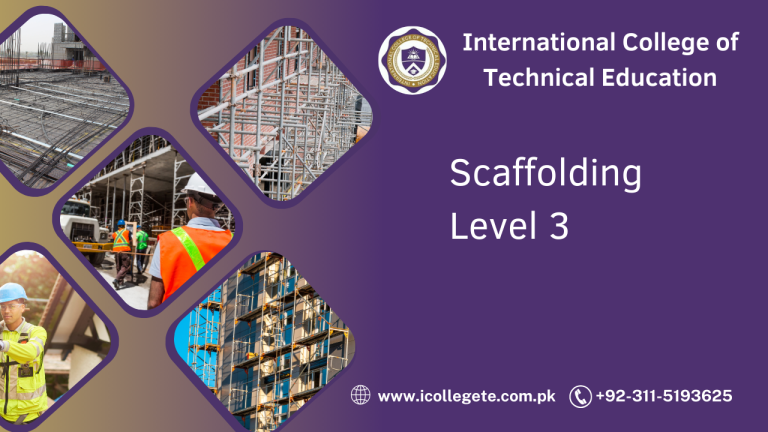In the world of civil engineering, ensuring the quality and safety of materials used in construction is crucial. This is where Civil Lab Technicians come in—professionals responsible for testing and analyzing materials like soil, concrete, aggregates, and asphalt to ensure they meet the required standards. The Civil Lab Technician Course in Islamabad is designed to provide hands-on training and in-depth knowledge of the testing and analysis processes that play a key role in the construction industry.
The Civil Lab Technician Course in Islamabad offers a comprehensive training program that equips individuals with the skills and knowledge required to perform laboratory tests on materials used in construction projects. The course is focused on building expertise in testing methods, interpreting results, and ensuring that construction materials are of the highest quality.
Participants will learn about the various materials tested in civil engineering projects, including soil, concrete, metals, aggregates, and bitumen, as well as the importance of proper testing procedures to guarantee the safety, durability, and stability of structures. Through hands-on practice and theoretical lessons, the course prepares students for a rewarding career as a civil lab technician.
Course Overview
The Civil Lab Technician Course offers an in-depth exploration of various lab testing methods used in the construction industry. Students will learn to test the physical and chemical properties of construction materials to ensure that they meet quality standards. This knowledge is critical for engineers, contractors, and builders who rely on accurate data to ensure the safety and longevity of buildings, roads, bridges, and other infrastructure projects.
The course includes both practical lab work and classroom-based theoretical learning, providing students with a balanced understanding of lab techniques, material science, and the importance of quality assurance in construction. Additionally, students will gain familiarity with the equipment used in testing, as well as how to analyze and report results in a clear, professional manner.
Study Units
The Civil Lab Technician Course in Islamabad is divided into several key study units that focus on different aspects of material testing and analysis:
- Introduction to Civil Lab Testing: Understanding the role of a civil lab technician and the importance of material testing in construction projects.
- Soil Testing: Techniques for testing soil properties, including compaction, permeability, and grain size analysis, to ensure the suitability of soil for construction.
- Concrete Testing: Methods for testing concrete strength, workability, and durability through tests such as slump, compressive strength, and air content.
- Aggregate Testing: Learning how to test the quality of aggregates, including tests for gradation, specific gravity, and moisture content, to ensure they meet industry standards.
- Bitumen and Asphalt Testing: Understanding the testing methods for bitumen and asphalt materials used in road construction, including viscosity, softening point, and penetration tests.
- Chemical Testing: Conducting chemical tests on materials to identify the presence of harmful substances that may affect the quality or strength of the material.
- Quality Assurance and Reporting: The importance of accurate data collection, analysis, and the preparation of professional test reports to ensure material quality and compliance with industry standards.
- Safety Protocols in the Lab: Understanding the safety measures and best practices for working with testing equipment and handling chemicals in a lab environment.
Learning Outcomes
Upon completion of the Civil Lab Technician Course, students will:
- Gain proficiency in performing common tests on construction materials like soil, concrete, aggregates, and asphalt.
- Be able to accurately interpret test results and identify any potential issues that could impact the quality of construction materials.
- Learn to operate laboratory equipment safely and effectively.
- Understand the procedures for compiling, documenting, and presenting test results in professional reports.
- Acquire knowledge of quality control measures and standards in construction material testing.
- Be prepared to assist engineers and construction teams in making informed decisions based on material testing data.
Course Benefits
- Hands-On Training: The course emphasizes practical, real-world training in laboratory settings, allowing students to gain direct experience with the equipment and procedures used in civil lab testing.
- In-Demand Skills: Civil lab technicians are in high demand in the construction industry, with professionals needed to ensure the safety and quality of materials used in large-scale construction projects.
- Comprehensive Knowledge: Students receive a well-rounded education that covers a variety of testing methods and materials, enabling them to work in diverse areas of civil engineering.
- Certification: Upon successful completion of the course, students receive a certification recognized by the industry, validating their qualifications as a civil lab technician.
- Career Opportunities: Graduates of the course are well-positioned to secure employment in construction companies, engineering firms, government agencies, and material testing laboratories.
- Industry-Relevant Curriculum: The course is designed to meet the current needs of the civil engineering and construction industries, ensuring that students learn the most up-to-date testing techniques and safety practices.
Who is This Course For?
The Civil Lab Technician Course in Islamabad is ideal for:
- Aspiring Lab Technicians: Individuals looking to start a career in civil engineering or construction material testing.
- Engineering Graduates: Those with a background in civil engineering who want to specialize in materials testing and quality control.
- Construction Professionals: Individuals working in construction who wish to gain expertise in material testing for better project execution.
- Technicians in Related Fields: Professionals like construction workers, site managers, or safety officers who want to expand their skillset in quality assurance and lab testing.
- Career Changers: Anyone with an interest in the civil engineering field who wants to make a transition into a laboratory or technical role.
Future Progression
After completing the Civil Lab Technician Course in Islamabad, students can explore several career paths and educational opportunities:
- Civil Lab Technician: Work with engineering firms, construction companies, or government agencies, providing testing and analysis services for construction materials.
- Quality Control Specialist: Transition into a role that focuses on ensuring the quality of materials and construction processes, either in a lab or on-site.
- Material Testing Consultant: Provide expert material testing and consulting services to construction companies, developers, and municipalities.
- Further Education: Pursue advanced certifications in specialized areas such as geotechnical testing, concrete technology, or asphalt testing to expand your career prospects.
- Project Manager: With experience, move into management roles overseeing material testing labs or construction projects, ensuring that all quality control processes are followed.
- Entrepreneurship: Open your own material testing lab or consultancy, providing services to construction companies, government projects, and private contractors.
The Civil Lab Technician Course in Islamabad offers a fantastic opportunity to gain specialized skills in one of the most important areas of civil engineering and construction. With comprehensive training in materials testing, quality assurance, and safety protocols, this course provides the foundation for a successful career in civil engineering. Whether you’re just starting your career or looking to specialize in material testing, this course offers the tools, knowledge, and certification to help you succeed in the competitive construction industry.
Embark on a rewarding journey as a certified civil lab technician and contribute to the development of safe, reliable, and sustainable infrastructure.






